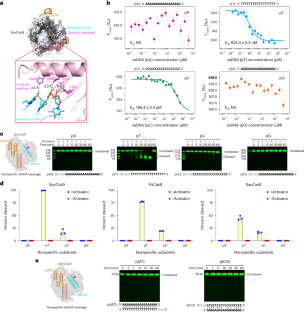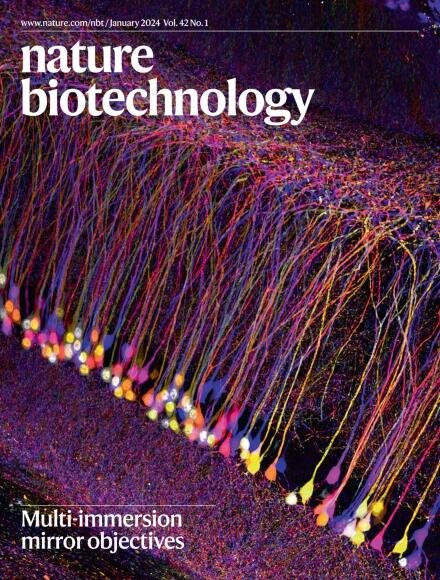Trans-nuclease activity of Cas9 activated by DNA or RNA target binding
IF 41.7
1区 生物学
Q1 BIOTECHNOLOGY & APPLIED MICROBIOLOGY
引用次数: 0
Abstract
Type V and type VI CRISPR–Cas systems have been shown to cleave nonspecific single-stranded DNA (ssDNA) or single-stranded RNA (ssRNA) in trans, but this has not been observed in type II CRISPR–Cas systems using single guide RNA. We show here that the type II CRISPR–Cas9 systems directed by CRISPR RNA and trans-activating CRISPR RNA dual RNAs show RuvC domain-dependent trans-cleavage activity for both ssDNA and ssRNA substrates. Cas9 possesses sequence preferences for trans-cleavage substrates, preferring to cleave T- or C-rich ssDNA substrates. We find that the trans-cleavage activity of Cas9 can be activated by target ssDNA, double-stranded DNA and ssRNA. The crystal structure of Cas9 in complex with guide RNA and target RNA provides a structural basis for the binding of target RNA to activate Cas9. Based on the trans-cleavage activity of Cas9 and nucleic acid amplification technology, we develop the nucleic acid detection platforms DNA-activated Cas9 detection and RNA-activated Cas9 detection, which are capable of detecting DNA and RNA samples with high sensitivity and specificity. Cas9 shows trans-cleavage activity and can be used for DNA and RNA detection.


通过 DNA 或 RNA 目标结合激活 Cas9 的转核酸酶活性
研究表明,V型和VI型CRISPR-Cas系统可以反式裂解非特异性单链DNA(ssDNA)或单链RNA(ssRNA),但在使用单导RNA的II型CRISPR-Cas系统中还没有观察到这种情况。我们在这里发现,由 CRISPR RNA 和反式激活 CRISPR RNA 双 RNA 引导的 II 型 CRISPR-Cas9 系统对 ssDNA 和 ssRNA 底物都表现出依赖 RuvC 结构域的反式切割活性。Cas9 对反式裂解底物具有序列偏好,更倾向于裂解富含 T 或 C 的 ssDNA 底物。我们发现,靶 ssDNA、双链 DNA 和 ssRNA 可激活 Cas9 的反式切割活性。Cas9 与引导 RNA 和靶 RNA 复合物的晶体结构为靶 RNA 结合激活 Cas9 提供了结构基础。基于Cas9的反式裂解活性和核酸扩增技术,我们开发了DNA激活Cas9检测和RNA激活Cas9检测的核酸检测平台,能够高灵敏度、高特异性地检测DNA和RNA样品。
本文章由计算机程序翻译,如有差异,请以英文原文为准。
求助全文
约1分钟内获得全文
求助全文
来源期刊

Nature biotechnology
工程技术-生物工程与应用微生物
CiteScore
63.00
自引率
1.70%
发文量
382
审稿时长
3 months
期刊介绍:
Nature Biotechnology is a monthly journal that focuses on the science and business of biotechnology. It covers a wide range of topics including technology/methodology advancements in the biological, biomedical, agricultural, and environmental sciences. The journal also explores the commercial, political, ethical, legal, and societal aspects of this research.
The journal serves researchers by providing peer-reviewed research papers in the field of biotechnology. It also serves the business community by delivering news about research developments. This approach ensures that both the scientific and business communities are well-informed and able to stay up-to-date on the latest advancements and opportunities in the field.
Some key areas of interest in which the journal actively seeks research papers include molecular engineering of nucleic acids and proteins, molecular therapy, large-scale biology, computational biology, regenerative medicine, imaging technology, analytical biotechnology, applied immunology, food and agricultural biotechnology, and environmental biotechnology.
In summary, Nature Biotechnology is a comprehensive journal that covers both the scientific and business aspects of biotechnology. It strives to provide researchers with valuable research papers and news while also delivering important scientific advancements to the business community.
 求助内容:
求助内容: 应助结果提醒方式:
应助结果提醒方式:


